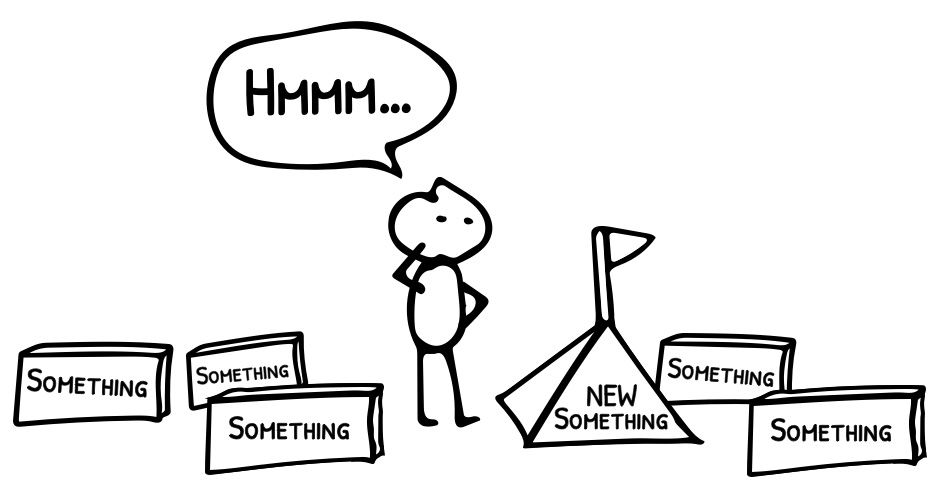
Over the past several years, I’ve had the opportunity to provide mentorship to college students at USC through the school’s entrepreneurship program. As I work with these students on their first business ideas, there’s a question I ask in almost every conversation:
How is your business different?
For first time entrepreneurs, and often experienced ones too, it’s easy to get tunnel vision around your product or service.
When thinking this way, we tend to oversimplify our customers’ lives. We focus only on the parts of their lives that are relevant to our business. When you look through that lens, it sounds easy to get someone’s attention.
But people are insanely complex. And the world is full of noise.
Pause and think about how many things are competing for your attention right now. If I want to tell you about something new that would benefit your life, it means you have to pause everything else to listen.
Now imagine a version of your life that incorporates this new thing. And then, try to remember that thing for a long time so you’ll keep believing it’s important for you.
That starts to sound like a much higher bar. Almost a scary-high bar.
This is why it’s so critical to understand what makes your business unique.
- How do you stand out in that sea of noise?
- How can your customers instantly see the benefit of your business in their lives?
- How will customers remember your business days, months, or years from now?
To maximize your brand positioning strategy, you need to understand the competition.
Standing Out From the Crowd
I read a recent article from Basecamp CEO, Jason Fried, on the idea of “Outlasting”. In it, he gives some excellent advice about reducing costs to extend the life of your business.
But towards the start of the piece he wrote:
“I wouldn’t advocate spending much time worrying about the competition — you really shouldn’t waste attention worrying about things you can’t control… ”
I agree with the core sentiment of this comment. We all waste time debating, discussing, and wringing our hands over things we can’t control.
But when it comes to differentiating your business, it’s critical to consider the competition.
This doesn’t mean worrying about every move your competitors may or may not make. But it does mean being aware of what they’re doing so that you can strengthen your unique position among them.
In the project management tool space for Basecamp, there are tons of competitors. And their competition isn’t limited strictly to specific project management tools. They’re competing against all the other crazy ways people opt to manage their work. This includes email, chat, spreadsheets, random post-it notes, whiteboards, or just trying to keep track of stuff in their head.

How does Basecamp stand out? How do they make sure that when potential customers think about managing projects, “Basecamp” holds a clear place in their mind?
I’ve worked in digital for almost 20 years and have used countless project management tools. There are plenty of other tools with more features and granular capabilities. But in my consulting work I often need to onboard clients onto a tool for a project. I don’t want fancy features, I want something that’s easy to use, easy to explain, and gets the job done.
For that purpose, Basecamp has occupied a unique position in my mind for almost a decade.
This didn’t happen by accident.
I can’t speak to the millions of decisions Jason Fried, DHH, and their team have made to get the product where it is now. But I have read their books and lots of blog posts about their philosophies on design and business.
They always advocate to keep things simple. Find efficiencies. Reduce waste.
These ideas are embodied in Basecamp. Basecamp is a true manifestation of their business values.
As a result, they’ve created a product that stands out in the sea of bloated, complex, project management tools.
This is what’s necessary to have long term success.
Maybe Jason and DHH simply did what they thought was right. Maybe they followed their beliefs, and it happened to coincide with a strong differentiated position in the landscape.
But based on their writing, I know they spend time thinking strategically about how they’re different. Their work indicates a conscious desire to embrace that position and further engrain it in the minds of their customers.
This is a point every business owner has to take the time to consider. If you don’t, it’ll be that much easier to get lost in the noise.
In the spirit of Jason’s point in his “Outlasting” article, every business needs to make the most of their time and resources. To do that, you have to consider the competition and your position in the landscape.
This doesn’t require months of research and hand wringing over the competition. But it does require concerted effort and strategic thinking.
- Look at what your customers are seeking to accomplish and what they value in a solution
- Look at what the competition is doing
- Align your offering with your customers’ needs in a way that’s different from your competitors
And once you identify the differentiating factors that work, double down and get that flag firmly planted in the brains of your customers.


